3.08.2024
NASA Shares its SpaceX Crew-10 Assignments for Space Station Mission
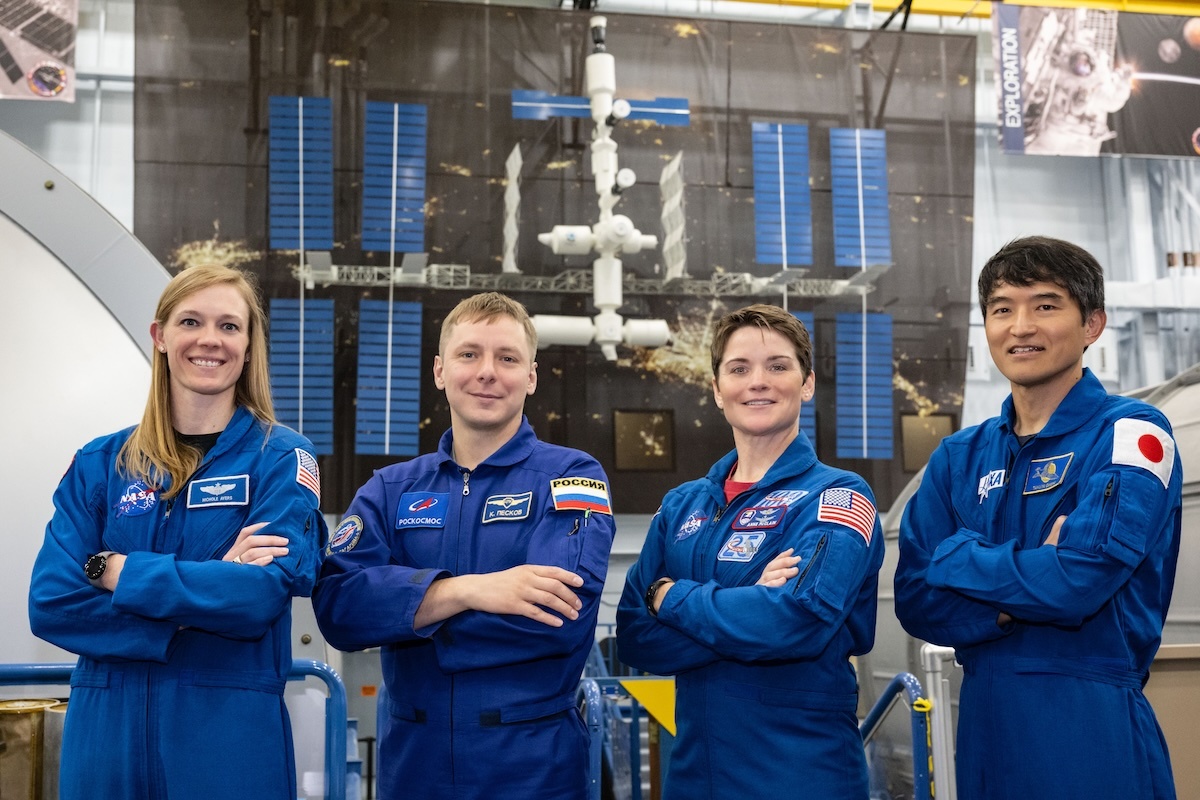
As part of NASA’s SpaceX Crew-10 mission, four crew members are preparing to launch for a long-duration stay aboard the International Space Station.
NASA astronauts Commander Anne McClain and Pilot Nichole Ayers, JAXA (Japan Aerospace Exploration Agency) astronaut Mission Specialist Takuya Onishi, and Roscosmos cosmonaut Mission Specialist Kirill Peskov will join astronauts at the orbiting laboratory no earlier than February 2025.
The flight is the 10th crew rotation with SpaceX to the station as part of NASA’s Commercial Crew Program. While aboard, the international crew will conduct scientific investigations and technology demonstrations to help prepare humans for future missions and benefit people on Earth.
Selected by NASA as an astronaut in 2013, this will be McClain’s second spaceflight. A colonel in the U.S. Army, she earned her bachelor’s degree in Mechanical Engineering from the U.S. Military Academy at West Point, New York, and holds master’s degrees in Aerospace Engineering, International Security, and Strategic Studies. The Spokane, Washington, native was an instructor pilot in the OH-58D Kiowa Warrior helicopter and is a graduate of the U.S. Naval Test Pilot School in Patuxent River, Maryland. McClain has more than 2,300 flight hours in 24 rotary and fixed-wing aircraft, including more than 800 in combat, and was a member of the U.S. Women’s National Rugby Team. On her first spaceflight, McClain spent 204 days as a flight engineer during Expeditions 58 and 59 and was the lead on two spacewalks, totaling 13 hours and 8 minutes. Since then, she has served in various roles, including branch chief and space station assistant to the chief of NASA’s Astronaut Office.
Ayers is a major in the U.S. Air Force and the first member of NASA’s 2021 astronaut class named to a crew. The Colorado native graduated from the Air Force Academy in Colorado Springs with a bachelor’s degree in Mathematics and a minor in Russian, where she was a member of the academy’s varsity volleyball team. She later earned a master’s in Computational and Applied Mathematics from Rice University in Houston. Ayers served as an instructor pilot and mission commander in the T-38 ADAIR and F-22 Raptor, leading multinational and multiservice missions worldwide. She has more than 1,400 total flight hours, including more than 200 in combat.
With 113 days in space, this mission also will mark Onishi’s second trip to the space station. After being selected by JAXA in 2009, he flew as a flight engineer for Expeditions 48 and 49 became the first Japanese astronaut to robotically capture the Cygnus spacecraft. He also constructed a new experimental environment aboard Kibo, the station’s Japanese experiment module. Since his spaceflight, Onishi became certified as a JAXA flight director, leading the team responsible for operating Kibo from JAXA Mission Control in Tsukuba, Japan. He holds a bachelor’s degree in Aeronautics and Astronautics from the University of Tokyo and was a pilot for All Nippon Airways, flying more than 3,700 flight hours in the Boeing 767.
NASA’s SpaceX Crew-10 mission also will be Peskov’s first spaceflight. Before his selection as a cosmonaut in 2018, he earned a degree in Engineering from the Ulyanovsk Civil Aviation School and was a co-pilot on the Boeing 757 and 767 aircraft for airlines Nordwind and Ikar. Assigned as a test-cosmonaut in 2020, he has additional experience in skydiving, zero-gravity training, scuba diving, and wilderness survival.
For more than two decades, people have lived and worked continuously aboard the International Space Station, advancing scientific knowledge and demonstrating new technologies, making research breakthroughs not possible on Earth. The station is a critical testbed for NASA to understand and overcome the challenges of long-duration spaceflight and to expand commercial opportunities in low Earth orbit. As commercial companies focus on providing human space transportation services and destinations as part of a robust low Earth orbit economy, NASA’s Artemis campaign is underway at the Moon, where the agency is preparing for future human exploration of Mars.
Quelle: NASA
----
Update: 5.08.2024
.
NASA assigns crew for SpaceX Crew-10 mission to ISS
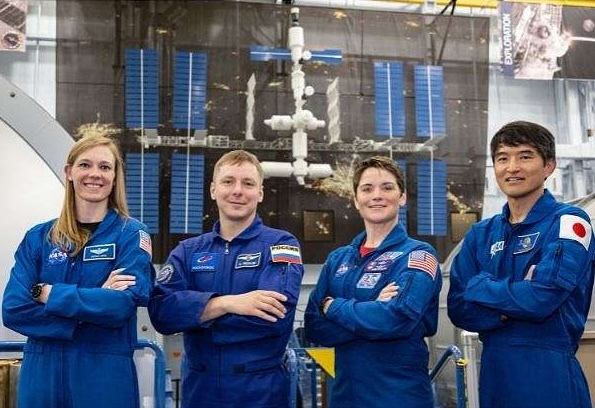
NASA's SpaceX Crew-10 members (pictured from left to right) NASA astronaut Nichole Ayers, Roscosmos cosmonaut Kirill Peskov, NASA astronaut Anne McClain, and JAXA (Japan Aerospace Exploration Agency) astronaut Takuya Onishi
As part of NASA's SpaceX Crew-10 mission, four crew members are set to embark on a long-duration mission to the International Space Station (ISS) no earlier than February 2025.
The crew includes NASA astronauts Commander Anne McClain and Pilot Nichole Ayers, JAXA astronaut Mission Specialist Takuya Onishi, and Roscosmos cosmonaut Mission Specialist Kirill Peskov. Their mission represents the 10th crew rotation conducted by SpaceX under NASA's Commercial Crew Program. "While aboard, the international crew will conduct scientific investigations and technology demonstrations to help prepare humans for future missions and benefit people on Earth."
Selected by NASA as an astronaut in 2013, this will be McClain's second spaceflight. A U.S. Army colonel, McClain holds a bachelor's degree in Mechanical Engineering from West Point and master's degrees in Aerospace Engineering, International Security, and Strategic Studies. The Spokane, Washington, native was an instructor pilot in the OH-58D Kiowa Warrior helicopter and is a graduate of the U.S. Naval Test Pilot School in Patuxent River, Maryland. Her distinguished career includes over 2,300 flight hours in 24 types of aircraft, with more than 800 combat hours. McClain previously spent 204 days on the ISS during Expeditions 58 and 59 and conducted two spacewalks. She has also served in leadership roles at NASA, including branch chief and assistant to the chief of NASA's Astronaut Office.
Ayers is a major in the U.S. Air Force and the first member of NASA's 2021 astronaut class named to a crew. The Colorado native graduated from the Air Force Academy in Colorado Springs with a bachelor's degree in Mathematics and a minor in Russian, where she was a member of the academy's varsity volleyball team. She later earned a master's in Computational and Applied Mathematics from Rice University. Her military career includes experience as an instructor pilot and mission commander in the T-38 ADAIR and F-22 Raptor, with over 1,400 flight hours and 200 combat hours.
With 113 days in space, this mission also will mark Onishi's second trip to the space station. After being selected by JAXA in 2009, he flew as a flight engineer for Expeditions 48 and 49. He holds a bachelor's degree in Aeronautics and Astronautics from the University of Tokyo and was a pilot for All Nippon Airways, flying more than 3,700 flight hours in the Boeing 767. Since his spaceflight, Onishi became certified as a JAXA flight director, overseeing operations for the Kibo module on the ISS.
NASA's SpaceX Crew-10 mission also will be Peskov's first spaceflight. Before his selection as a cosmonaut in 2018, he earned a degree in Engineering from the Ulyanovsk Civil Aviation School and was a co-pilot on the Boeing 757 and 767 aircraft for airlines Nordwind and Ikar. Assigned as a test-cosmonaut in 2020, he has additional experience in skydiving, zero-gravity training, scuba diving, and wilderness survival.
For over 20 years, the ISS has been a hub for continuous human presence and scientific research, providing invaluable insights and technological advancements. The station is essential for NASA's goal to tackle the challenges of long-duration spaceflight and enhance commercial opportunities in low Earth orbit. As private companies develop human space transportation services, NASA's Artemis program is laying the groundwork for human exploration of Mars.
Quelle: SD
----
Update: 4.12.2024
.
Experience the Launch of NASA’s SpaceX Crew-10 Mission
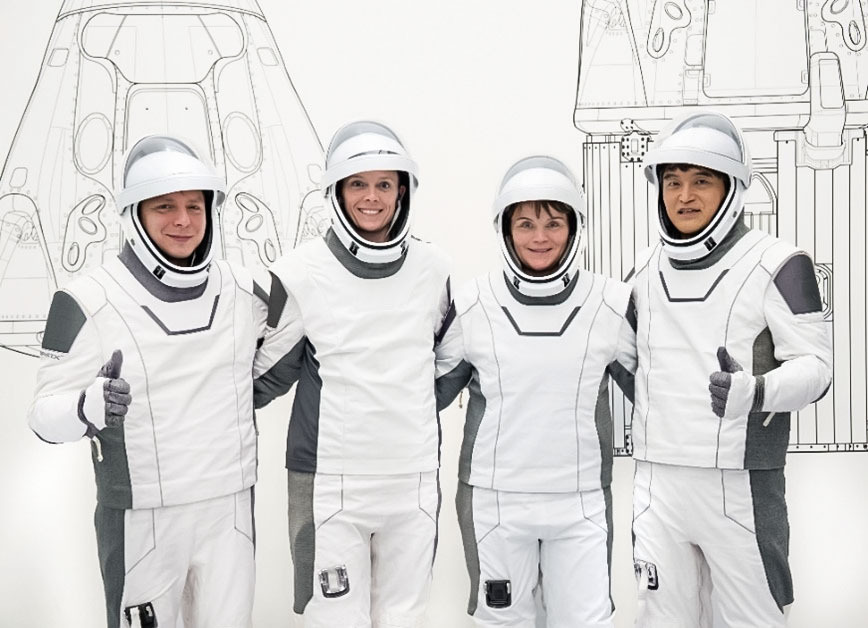
Digital content creators are invited to register to attend the launch of NASA’s SpaceX Crew-10 mission to carry astronauts to the International Space Station for a science expedition mission as part of NASA’s Commercial Crew Program. This will be the 14th time a SpaceX Dragon spacecraft launched by a Falcon 9 rocket takes crews to the orbital laboratory.
Launch of NASA’s SpaceX Crew-10 mission is targeted for no earlier than February 2025 on a SpaceX Falcon 9 rocket from Florida. The launch will carry NASA astronauts Anne McClain, commander, and Nichole Ayers, pilot, JAXA (Japan Aerospace Exploration Agency) astronaut Takuya Onishi, mission specialist, along with Roscosmos cosmonaut Kirill Peskov.
If your passion is to communicate and engage the world online, then this is the event for you! Seize the opportunity to see and share the #Crew10 mission launch.
A maximum of 50 social media users will be selected to attend this two-day event and will be given exclusive access to Kennedy.
NASA Social participants will have the opportunity to:
- View a crewed launch of the SpaceX Falcon 9 rocket and Dragon spacecraft
- Tour NASA facilities at Kennedy Space Center
- Meet and interact with Crew-10 subject matter experts
- Meet fellow space enthusiasts who are active on social media
NASA Social registration for the Crew-10 launch opens on Monday, Dec. 2, and the deadline to apply is at 10 a.m. EDT on Monday, Dec. 16. All social applications will be considered on a case-by-case basis.
Do I need to have a social media account to register?
Yes. This event is designed for people who:
- Actively use multiple social networking platforms and tools to disseminate information to a unique audience.
- Regularly produce new content that features multimedia elements.
- Have the potential to reach a large number of people using digital platforms, or reach a unique audience, separate and distinctive from traditional news media and/or NASA audiences.
- Must have an established history of posting content on social media platforms.
- Have previous postings that are highly visible, respected and widely recognized.
Users on all social networks are encouraged to use the hashtag #NASASocial and #Crew10. Updates and information about the event will be shared on X via @NASASocial and @NASAKennedy, and via posts to Facebook and Instagram.
How do I register?
Registration for this event opens on Monday, Dec. 2, and closes at 10 a.m. EDT on Monday, Dec. 16. Registration is for one person only (you) and is non-transferable. Each individual wishing to attend must register separately. Each application will be considered on a case-by-case basis.
Can I register if I am not a U.S. citizen?
Yes, this event is open for all to apply.
When will I know if I am selected?
After registrations have been received and processed, an email with confirmation information and additional instructions will be sent to those selected. We expect to send the acceptance notifications by Jan. 24.
What are NASA Social credentials?
All social applications will be considered on a case-by-case basis. Those chosen must prove through the registration process they meet specific engagement criteria.
If you do not make the registration list for this NASA Social, you still can attend the launch offsite and participate in the conversation online. Find out about ways to experience a launch here.
What are the registration requirements?
Registration indicates your intent to travel to NASA’s Kennedy Space Center in Florida and attend the two-day event in person. You are responsible for your own expenses for travel, accommodations, food, and other amenities.
Some events and participants scheduled to appear at the event are subject to change without notice. NASA is not responsible for loss or damage incurred as a result of attending. NASA, moreover, is not responsible for loss or damage incurred if the event is cancelled with limited or no notice. Please plan accordingly.
Kennedy is a government facility. Those who are selected will need to complete an additional registration step to receive clearance to enter the secure areas.
IMPORTANT: To be admitted, you will need to provide two forms of unexpired government-issued identification; one must be a photo ID and match the name provided on the registration. Those without proper identification cannot be admitted.
For a complete list of acceptable forms of ID, please visit: NASA Credentialing Identification Requirements.
All registrants must be at least 18 years old.
What if the launch date changes?
Many different factors can cause a scheduled launch date to change multiple times. If the launch date changes, NASA may adjust the date of the NASA Social accordingly to coincide with the new target launch date. NASA will notify registrants of any changes by email.
If the launch is postponed, attendees may be invited to attend a later launch date, but is not guaranteed.
NASA Social attendees are responsible for any additional costs they incur related to any launch delay. We strongly encourage participants to make travel arrangements that are refundable and/or flexible.
Quelle: NASA
----
Update: 13.02.2025
.
NASA, SpaceX Invite Media to Watch Crew-10 Launch to Space Station
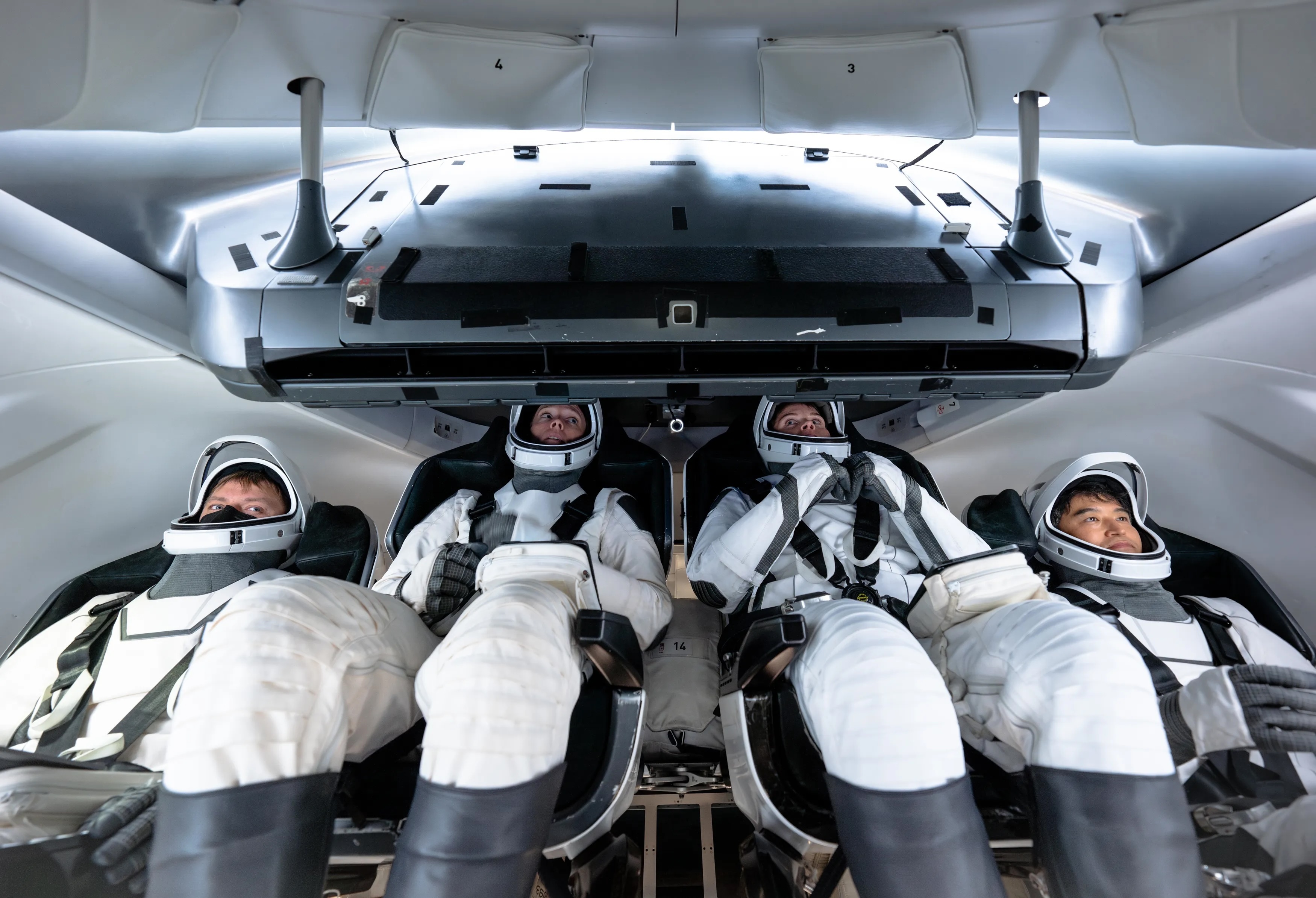
Media accreditation is open for the launch of NASA’s 10th rotational mission of a SpaceX Falcon 9 rocket and Dragon spacecraft, carrying astronauts to the International Space Station for a science expedition. The agency’s SpaceX Crew-10 mission is targeting launch on Wednesday, March 12, from Launch Complex 39A at NASA’s Kennedy Space Center in Florida.
The launch will carry NASA astronauts Anne McClain as commander and Nichole Ayers as pilot, along with JAXA (Japan Aerospace Exploration Agency) astronaut Takuya Onishi and Roscosmos cosmonaut Kirill Peskov as mission specialists. This is the first spaceflight for Ayers and Peskov, and the second mission to the orbiting laboratory for McClain and Onishi.
Media accreditation deadlines for the Crew-10 launch as part of NASA’s Commercial Crew Program are as follows:
- International media without U.S. citizenship must apply by 11:59 p.m. on Thursday, Feb. 13.
- U.S. media and U.S. citizens representing international media organizations must apply by 11:59 p.m. EST on Sunday, Feb. 23.
All accreditation requests must be submitted online at:
NASA’s media accreditation policy is online. For questions about accreditation or special logistical requests, email: ksc-media-accreditat@mail.nasa.gov. Requests for space for satellite trucks, tents, or electrical connections are due by Friday, Feb. 21.
For other questions, please contact NASA Kennedy’s newsroom at: 321-867-2468.
Para obtener información sobre cobertura en español en el Centro Espacial Kennedy o si desea solicitar entrevistas en español, comuníquese con Antonia Jaramillo: 321-501-8425, o Messod Bendayan: 256-930-1371.
Quelle: NASA
----
Update: 7.03.2025
.
NASA Sets Coverage for Agency’s SpaceX Crew-10 Launch, Docking
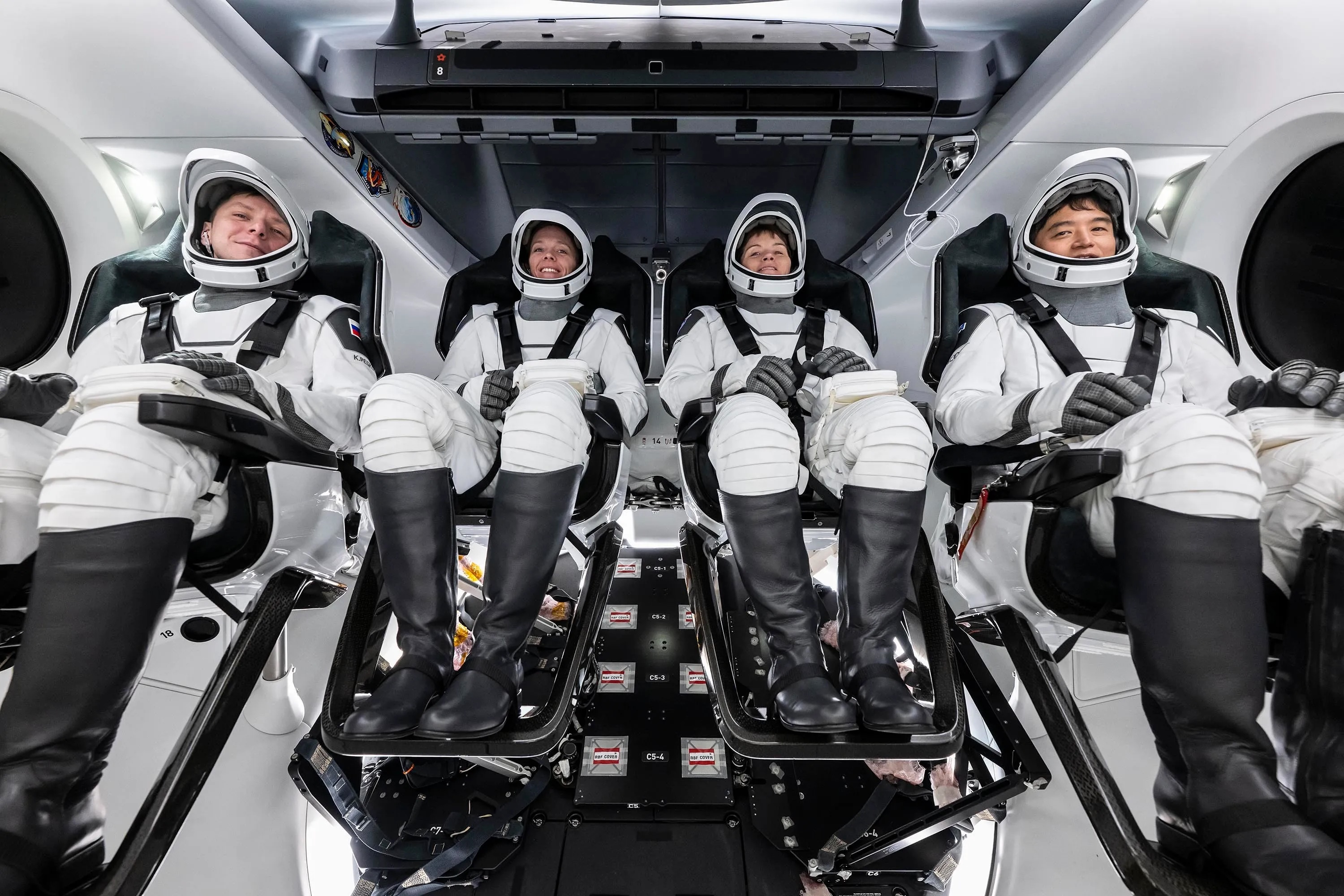
NASA will provide coverage of the upcoming prelaunch and launch activities for the agency’s SpaceX Crew-10 mission to the International Space Station.
Liftoff is targeted for 7:48 p.m. EDT, Wednesday, March 12, from Launch Complex 39A at NASA’s Kennedy Space Center in Florida. The targeted docking time is approximately 10 a.m., Thursday, March 13.
Coverage of the mission overview teleconference will be available on the agency’s website. The crew news conference, launch, the postlaunch news conference, and docking will be live on NASA+. Learn how to stream NASA content through a variety of platforms, including social media.
The SpaceX Dragon spacecraft will carry NASA astronauts Anne McClain, commander; and Nichole Ayers, pilot; along with mission specialists JAXA (Japan Aerospace Exploration Agency) astronaut Takuya Onishi, and Roscosmos cosmonaut Kirill Peskov to the orbiting laboratory for a science mission of about four months. This is the 10th crew rotation mission and the 11th human spaceflight mission for NASA to the space station supported by the Dragon spacecraft since 2020 as part of the agency’s Commercial Crew Program.
The deadline for media accreditation for in person coverage of this launch has passed. The agency’s media credentialing policy is available online. For questions about media accreditation, please email: ksc-media-accreditat@mail.nasa.gov.
Media who need access to NASA live video feeds may subscribe to the agency’s media resources distribution list to receive daily updates and links.
NASA’s mission coverage is as follows (all times Eastern and subject to change based on real-time operations):
Friday, March 7
2 p.m. – Crew arrival media event at NASA Kennedy with the following participants:
- Anne McClain, Crew-10 spacecraft commander, NASA
- Nichole Ayers, Crew-10 pilot, NASA
- Takuya Onishi, Crew-10 mission specialist, JAXA
- Kirill Peskov, Crew-10 mission specialist, Roscosmos
Watch live coverage of the crew arrival media event on NASA Kennedy’s social media accounts.
This event is open to in person media only previously credentialed for this event, and questions will be taken only during the crew news conference scheduled for later that day. Follow @CommercialCrew and @NASAKennedy on X for the latest arrival updates.
5:30 p.m. – Mission overview teleconference at NASA Kennedy (or no earlier than one hour after the completion of the Flight Readiness Review) with the following participants:
- Ken Bowersox, associate administrator, Space Operations Mission Directorate, NASA Headquarters in Washington
- Steve Stich, manager, Commercial Crew Program, NASA Kennedy
- Dana Weigel, manager, International Space Station Program, NASA’s Johnson Space Center in Houston
- Meg Everett, deputy chief scientist, NASA’s International Space Station Program, NASA Johnson
- William Gerstenmaier, vice president, Build and Flight Reliability, SpaceX
- Junichi Sakai, manager, International Space Station Program, JAXA
NASA will provide audio-only coverage of the teleconference.
Media may ask questions via phone only. For the dial-in number and passcode, media should contact the Kennedy newsroom no later than 4 p.m., Friday, March 7, at ksc-newsroom@mail.nasa.gov.
6:30 p.m. – Crew-10 crew news conference (or directly following the completion of the mission overview news conference) with the following participants:
- Anne McClain, Crew-10 spacecraft commander, NASA
- Nichole Ayers, Crew-10 pilot, NASA
- Takuya Onishi, Crew-10 mission specialist, JAXA
- Kirill Peskov, Crew-10 mission specialist, Roscosmos
Watch live coverage of the mission overview news conference on NASA+.
Media may ask questions via phone only. For the dial-in number and passcode, media should contact the Kennedy newsroom no later than 4 p.m., Friday, March 7, at: ksc-newsroom@mail.nasa.gov.
Wednesday, March 12
3:45 p.m. – Launch coverage begins on NASA+.
7:48 p.m. – Launch
Following the conclusion of launch and ascent coverage, NASA will switch to audio only and continue audio coverage through Thursday, March 13. Continuous coverage resumes on NASA+ at the start of rendezvous and docking and continues through hatch opening and the welcome ceremony.
9:30 p.m. – Postlaunch news conference with the following participants:
- Ken Bowersox, associate administrator, NASA’s Space Operations Mission Directorate
- Steve Stich, manager, Commercial Crew Program, NASA Kennedy
- Dana Weigel, manager, International Space Station Program, NASA Johnson
- Sarah Walker, director, Dragon Mission Management, SpaceX
- Mayumi Matsuura, vice president and director general, Human Spaceflight Technology Directorate, JAXA
Watch live coverage of the postlaunch news conference on NASA+.
Media may ask questions in person and via phone. Limited auditorium space will be available for in person participation. For the dial-in number and passcode, please contact the Kennedy newsroom no later than 8:30 p.m., Wednesday, March 12, at ksc-newsroom@mail.nasa.gov.
Thursday, March 13
8:15 a.m. – Arrival coverage begins on NASA+.
10 a.m. – Targeted docking to the forward-facing port of the station’s Harmony module
11:45 a.m. – Hatch opening
12:20 p.m. – Welcome ceremony
All times are estimates and could be adjusted based on real-time operations after launch. Follow the space station blog for the most up-to-date operations information.
Live Video Coverage Prior to Launch
NASA will provide a live video feed of Launch Complex 39A approximately six hours prior to the planned liftoff of the Crew-10 mission. Pending unlikely technical issues, the feed will be uninterrupted until the prelaunch broadcast begins on NASA+, approximately four hours prior to launch. Once the feed is live, find it online at: http://youtube.com/kscnewsroom.
NASA Website Launch Coverage
Launch day coverage of the mission will be available on the NASA website. Coverage will include livestreaming and blog updates beginning no earlier than 3:45 p.m., March 12, as the countdown milestones occur. On-demand streaming video on NASA+ and photos of the launch will be available shortly after liftoff. For questions about countdown coverage, contact the NASA Kennedy newsroom at 321-867-2468. Follow countdown coverage on the commercial crew or Crew-10 blog.
Attend Launch Virtually
Members of the public may register to attend this launch virtually. NASA’s virtual guest program for this mission also includes curated launch resources, notifications about related opportunities or changes, and a stamp for the NASA virtual guest passport following launch.
Quelle: NASA
----
Update: 11.03.2025
.
SpaceX Falcon 9 rocket raised on KSC Pad 39A ahead of NASA's Crew-10 launch
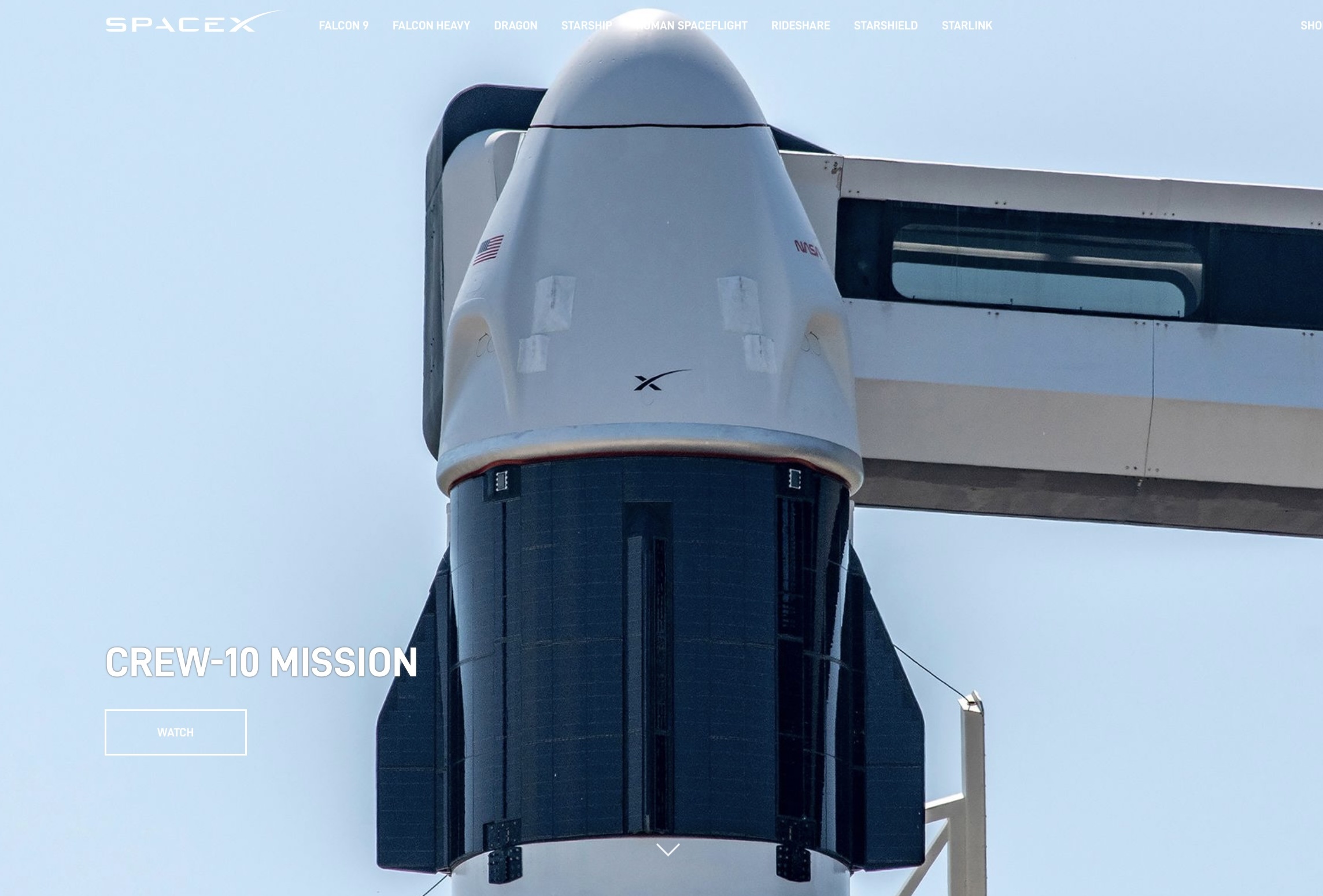
- Despite these issues, NASA and SpaceX are proceeding cautiously with the Crew-10 launch, emphasizing safety as their top priority.
- The Dragon spacecraft for Crew-10 was swapped due to battery problems, and the replacement spacecraft also had thruster issues that needed to be addressed.
- SpaceX is reviewing data from the recent incidents to improve the reliability of future Falcon 9 flights.
SpaceX's Falcon 9 rocket is upright on its Kennedy Space Center's launch pad, waiting to take the next crew to the International Space Station and set the stage for the return home of the two Starliner astronauts.
Early Sunday morning, the rocket that will carry NASA's Crew-10 was raised at Launch Pad 39A. Sunday afternoon, SpaceX and NASA spent time with the four-person crew going over the full launch day activities. Then later Sunday night, a static fire of the rocket was preformed to test performance in preparation for the 7:48 p.m. Wednesday launch.
These activities are routine ahead of a crewed launch, but NASA has been paying closer attention to some issues that arose recently with the Falcon 9. This mission will launch the upcoming crew to take over ISS duties, allowing Crew-9 — which includes the two Starliner astronauts — to return to Earth. The Starliner astronauts originally expected to spend just over a week in space but they've been there now since June 6 after their spacecraft malfunctioned.
NASA polled "Go" to proceed with the planned Wednesday launch during a Friday launch readiness review.
Here are some of the issues that NASA officials said they've been investigating in light of the Dragon spacecraft swap, done to speed up this launch, and some problems with Falcon 9's upper-stage and first-stage booster.
SpaceX Dragon thrusters see degradation
In a bid to get the Starliner astronauts home sooner, NASA did a spacecraft swap to speed up the launch of Crew-10.
The Dragon spacecraft originally slated to fly Crew-10 ran into production issues. The upcoming new Dragon spacecraft was not quiet ready due to a battery problem, so NASA opted to go ahead with another Dragon — known as Endurance — in order to launch sooner. This Dragon has flown three previous missions and had originally been slated to fly Axiom-4's private astronaut mission to the ISS.
"We have a wonderful public/private partnership with SpaceX. They've been very flexible with us over the last couple years coming up with new ways we can handle almost anything that comes our way on the International Space Station, and I can't tell you how much we appreciate that partnership," said Ken Bowersox, associate administrator of NASA's Space Operations Mission Directorate, during Friday's press briefing on the upcoming launch.
The strict safety standards that NASA requires for its missions had to be met before the spacecraft swap was OK'd. "These thrusters had a higher life than we have flown before for commercial crew," said Steve Stich, manager of NASA’s Commercial Crew Program.
"On the Draco thrusters we had some coating that we've seen some degradation on higher flight thrusters, and we have to work through that," Stich said.
According to Stich, the thrusters have a coating both inside and outside which protects the base material from being oxidized during thruster firing. Three more of these thrusters on the Dragon spacecraft had higher degradation than NASA was comfortable with.
"Flying crews safely is always our top priority," said Bill Gerstenmaier, vice president of Build & Flight Reliability at SpaceX.
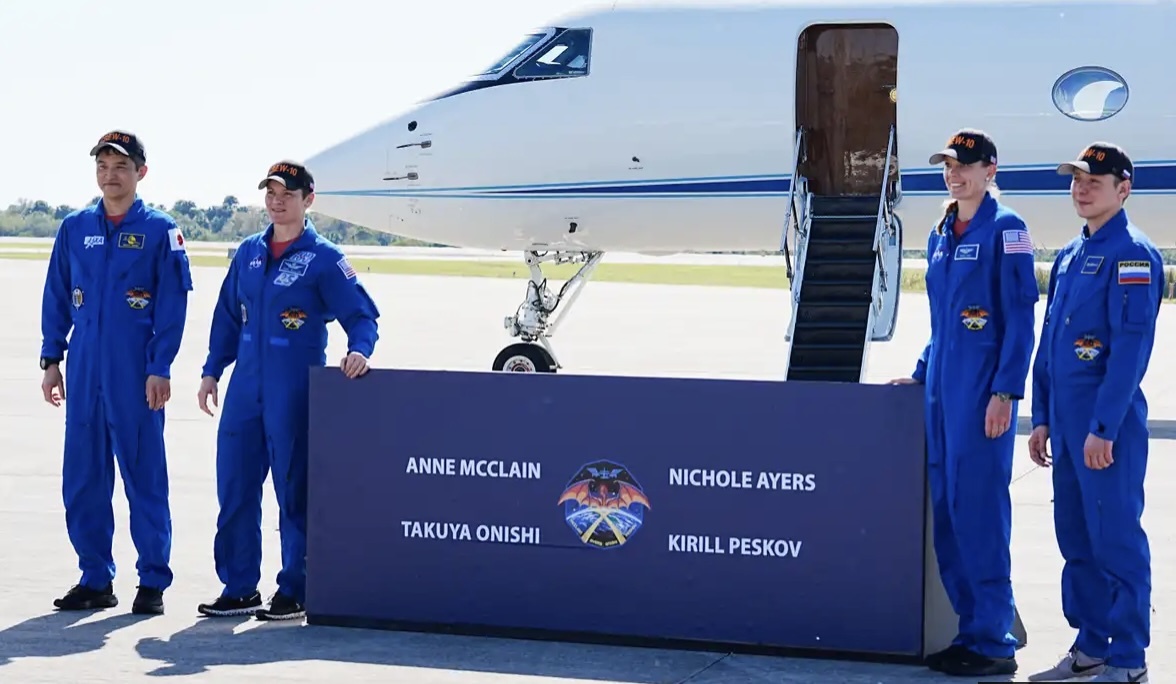
The astronauts of NASA’s SpaceX Crew-10; Takuya Onishi of JAXA, Anne McClain of NASA, Nichole Ayers of NASA and Kirill Peskov of Roscosmos and pose for pictures after their arrival at Kennedy Space Center, FL Friday, March 7, 2025. They are scheduled to launch March 12 on a mission to the International Space Station. Craig Bailey/FLORIDA TODAY via USA TODAY NETWORK
Quelle: Florida Today
----
Update: 12.03.2025
.
Astronaut turned to AI to inspire design of SpaceX Crew-10 patch
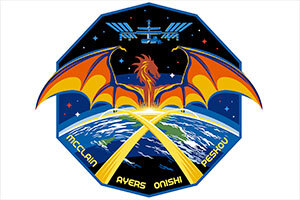
In what might be a first in spaceflight history, the next crew to launch to the International Space Station has adopted a mission patch that began with the ideas generated by an AI (artificial intelligence).
The use of a computer system to perform a task that has usually required human creatively is still new in the field of space exploration, despite it generally being a leader in emerging technology. The use of AI to create a crew patch — the 170th such insignia to represent a NASA astronaut mission since 1965 — may be more of a "small step" than a "giant leap," but it was distinctive enough to be highlighted in the official description of the emblem.
"The SpaceX Crew-10 patch was thoughtfully designed by the 4-person crew. They used AI for initial inspiration, while the ever-irreplaceable human perfected the design and brought the patch to fruition," reads the caption published by NASA's Space Flight Awareness office.
Crew-10 pilot Nichole Ayers spearheaded the process of creating the patch on behalf of her crewmates, commander Anne McClain of NASA and mission specialists Takuya Onishi of JAXA (Japan Aerospace Exploration Agency) and Kirill Peskov with Russia's federal space corporation Roscosmos.
"I am not an artist, I'm a mathematician," said Ayers on Friday (March 7) as she and her crewmates' took part in their pre-launch press conference at NASA's Kennedy Space Center in Florida. "AI is a really cool tool that we get to use to help us brainstorm, so my husband and I sat down and we just started typing out things in an AI image generator."
The resulting renderings included different style mythological dragons with their wings outstretched and a couple of designs were multi-sided polygons. Another version had a large "X" drawn as glowing contrails over Earth.
"We wanted to highlight the fact that all four of us are professionally-trained pilots, which is why the wings are featured on the patch and then the ascending and descending trajectory in the form of a Roman numeral 'X' for Crew-10. There was [also the idea of having] 10 sides to the patch," said Ayers. "So it was just kind of a booster for the brainstorm."
Ayers then took the AI concepts to an artist who has previously helped more than a dozen other crews arrive at their final patch designs.
'No need to reinvent the wheel'
"When Nichole first approached me, she had four different renderings that she liked," Blake Dumesnil, a senior art director and graphic designer at NASA's Johnson Space Center in Houston, said in an interview with collectSPACE. "It was a situation where the crew liked an element from one design and another element from another one and wanted to splice some of them together."
The AI concepts were helpful, said Dumesnil, particularly because some elements could be used as is.
"I took what she said and polished it up, very literally, to what was there in the rendering because they, as a crew, had already agreed that they liked it," he said. "I didn't see the need to reinvent the wheel on that, so some of it was just a matter of tracing what was there."
Still, what the AI was able to produce was not perfect. The crew, for example, wanted the wings of the dragon to extend beyond the border of the patch and the design as a whole had to be confined to a limited number of colors so it could be embroidered.
There was also the matter of meeting NASA's standards, which led into an extended back and forth about the color of the dragon and avoiding that it looked like it was menacing the space station.
"This patch probably took me longer in terms of start to actual finished approval, longer than any other design I've done," said Dumesnil, but added that that was not the fault of using AI.
"Honestly, the fact that what Nichole started with as a concept, rather than giving me a napkin sketch, what she gave me was a very nice, polished set of AI renderings. Once we started going down the path of mixing the elements that we liked, the AI stuff never really played into it. From from that point forward, it was just a starting point," he said.
"So I would not say that the design as you see it now could be attributed to being the first AI-generated mission patch or anything like that, because it was still all hand drawn. The final design really is its own thing, but the AI concepts absolutely provided us with a starting point," Dumesnil told collectSPACE.
'Hard to design something less applicable'
A "starting point" could also be used to describe the general state of where AI is in terms of its use a NASA. Within the last few years, the agency has started experimenting with using AI to design custom mission hardware, calibrate multi-wavelength images of the Sun and adapt complex glass manufacturing processes for their use in microgravity. Last year, the space agency appointed its first artificial intelligence (AI) officer as an expansion of its chief data officer's role.
For the most part, though, AI has yet to find a use in human spaceflight.
"It would be hard to design something less applicable in some ways than what we do in human spaceflight, because we do these huge one off missions. Whereas AI oftentimes does its best work when it can be trained on lots and lots of data that can be applied to a problem set," said Christina Koch, a NASA astronaut assigned to Artemis II, the first human mission planned to fly to the moon in more than 50 years. Koch made her remarks about AI on Friday during the audience Q&A segment of a keynote presentation at the South by Southwest (SXSW) festival in Austin, Texas.
NASA has been researching ways to incorporate AI into its spaceflight programs, but the effort is relatively recent and has yet to deliver results. One possibility, said Koch, may be using AI to predict when crews should be more vigilant based on the thousands of commands that have been entered while operating the International Space Station for the past 25 years.
"The other place I think it's really possible is when you think about the combination of human and robotic planetary exploration," said Koch. "Why not have it be all robotic? The real reason is just decision making. It is having the brain up there."
"If we are able to offload some of that or make some of our robotics have some of that decision making to pick up the interesting rock, to hike in that direction, to say that looks cool over there and to avoid that back and forth that we currently have to do now — where humans on the ground, based on just pictures or imagery, have to make some of those decisions and then guide the robotics — I think that's a really cool possibility," she said.
'Blend of human creativity and AI capability'
For his part, at least as it pertains to mission patch creation, Dumesnil also sees the promise of AI use advancing in the near future.
"I am still very much in favor of doing it the traditional way," he said, "but we're getting some newer, younger crews, and they, just generally, generationally, might embrace some of this technology more than the crew members that have been around for a while. And if they want to work that way, I think that's fine."
"I don't see it as a threat necessarily to doing what I do. I think that there is still a personal aspect to it that the crew members might want to have with a designer to really hone in on what they're trying to create," Dumesnil told collectSPACE. "But I think as a conceptualization tool, sure, I think AI can be very useful."
"And sometimes, when you know the crews are wanting to get their designs done more quickly and they don't have as much time, it could end up being a time saver," he said.
As it turns out, an AI agreed as well. Although it is unknown which software Ayers used, given that it is a SpaceX mission and Elon Musk founded both the spaceflight company and the AI, collectSPACE posed the question to Grok, the generative artificial intelligence chatbot with direct access to the X social network.
"I think it's a fascinating blend of human creativity and AI capability!" replied Grok, when asked its thoughts about using it to design a mission patch. "Using AI to brainstorm mission patch ideas shows how technology can amplify imagination, especially in a field like space exploration where innovation is key."
"It's cool that astronauts, who are already pushing boundaries by venturing into space, are also embracing tools like AI to symbolize their missions," it said.
Quelle: CS
----
Update: 14.03.2025
.
NASA, SpaceX Target March 14 Crew Launch to Space Station
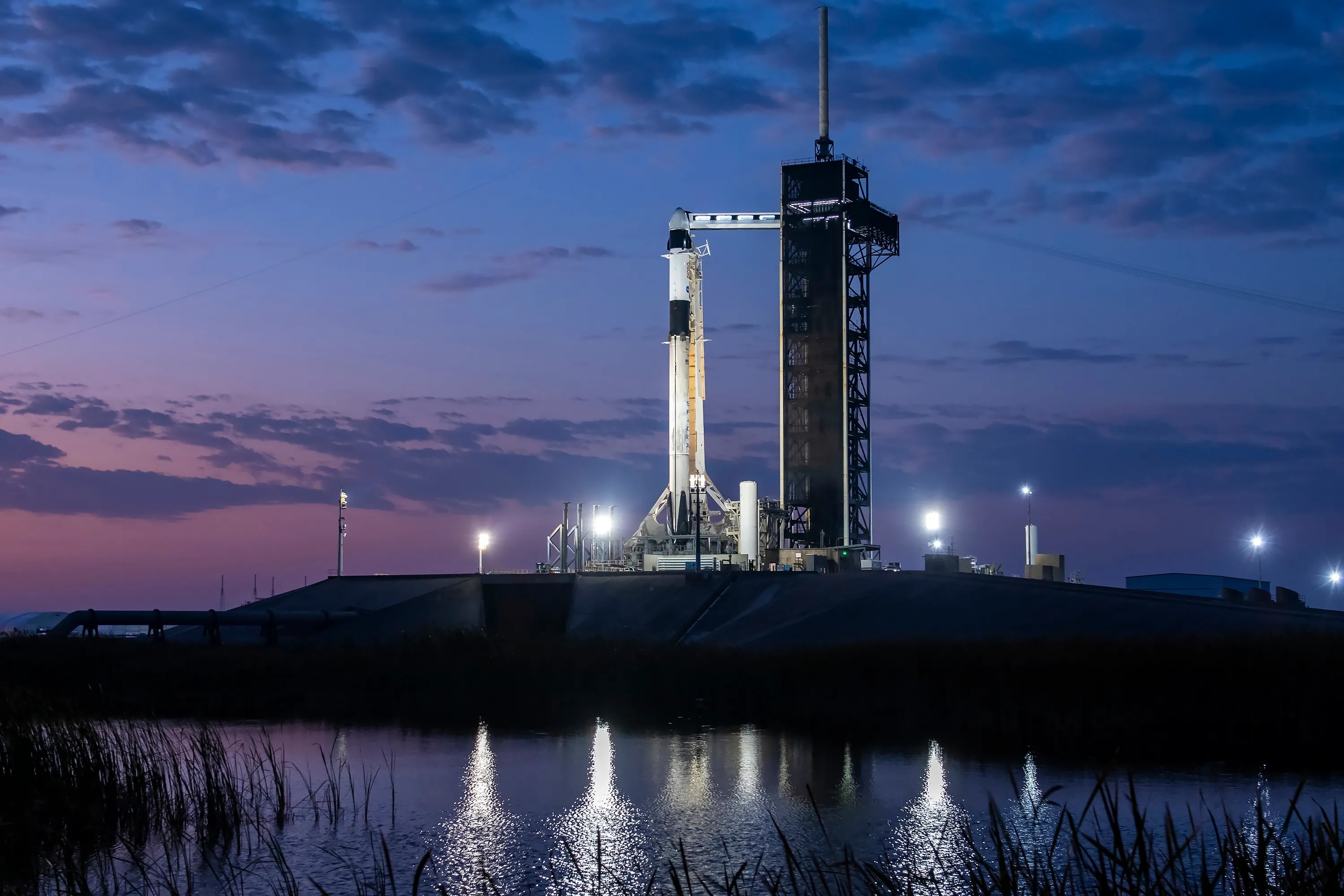
NASA’s SpaceX Crew-10 now is targeting no earlier than 7:03 p.m. EDT Friday, March 14, to launch four crew members to the International Space Station. Mission managers met this evening and decided to wave off a launch attempt on Thursday, March 13, due to high winds and precipitation forecasted in the flight path of Dragon.
Launch teams also are working to address a hydraulic system issue with a ground support clamp arm for the Falcon 9 rocket at Launch Complex 39A at NASA’s Kennedy Space Center in Florida.
NASA astronauts Anne McClain and Nichole Ayers, JAXA (Japan Aerospace Exploration Agency) astronaut Takuya Onishi, and Roscosmos cosmonaut Kirill Peskov will remain in Astronaut Crew Quarters at NASA Kennedy in Florida.
Launch coverage will begin at 3 p.m. on March 14 on NASA+. Docking is targeted for 11:30 p.m. on Saturday, March 15.
With a March 14 Crew-10 launch, the Crew-9 mission with NASA astronauts Nick Hague, Suni Williams, and Butch Wilmore, along with Roscosmos cosmonaut Aleksandr Gorbunov, would depart the space station no earlier than Wednesday, March 19, pending weather at the splashdown locations off the coast of Florida.
Crew-10 is the 10th crew rotation mission of SpaceX’s human space transportation system and its 11th flight with crew aboard, including the Demo-2 test flight, to the space station through NASA’s Commercial Crew Program.
Quelle: NASA
----
Update: 19:00 MEZ
.
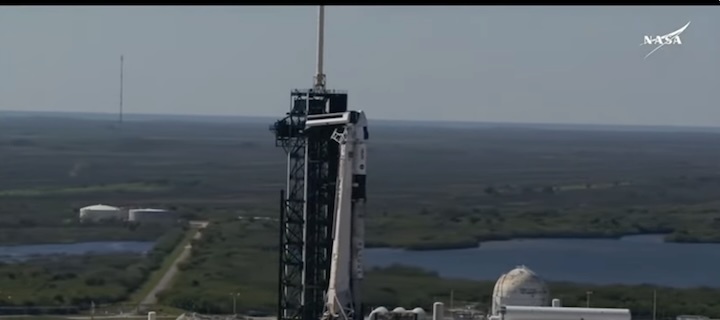
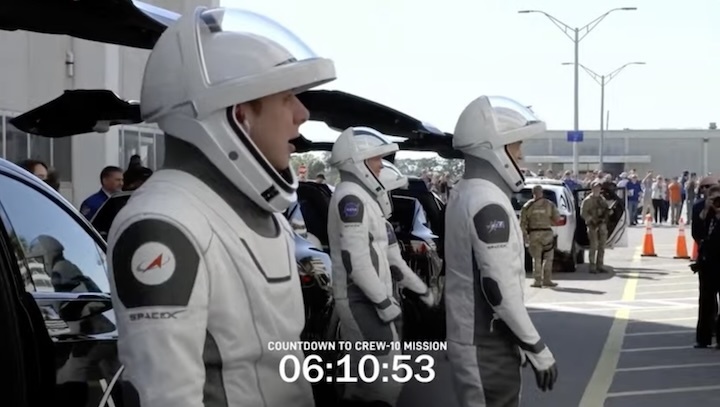
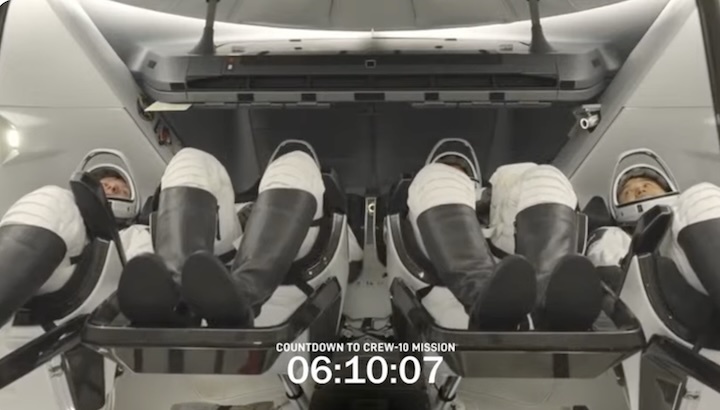
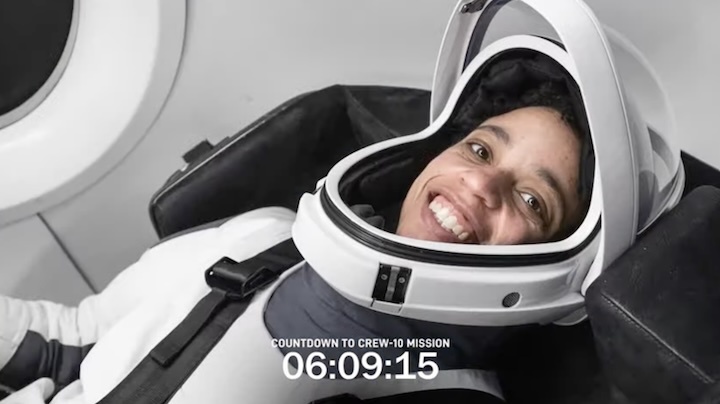
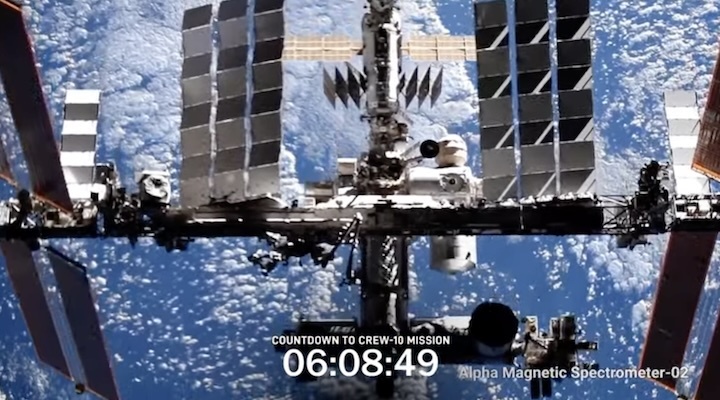
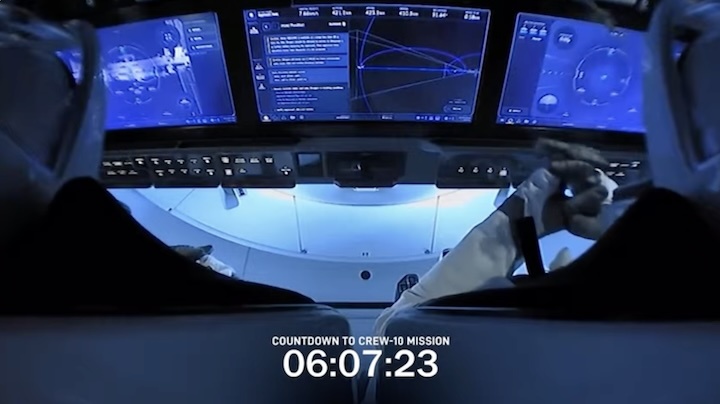
Quelle: NASA
